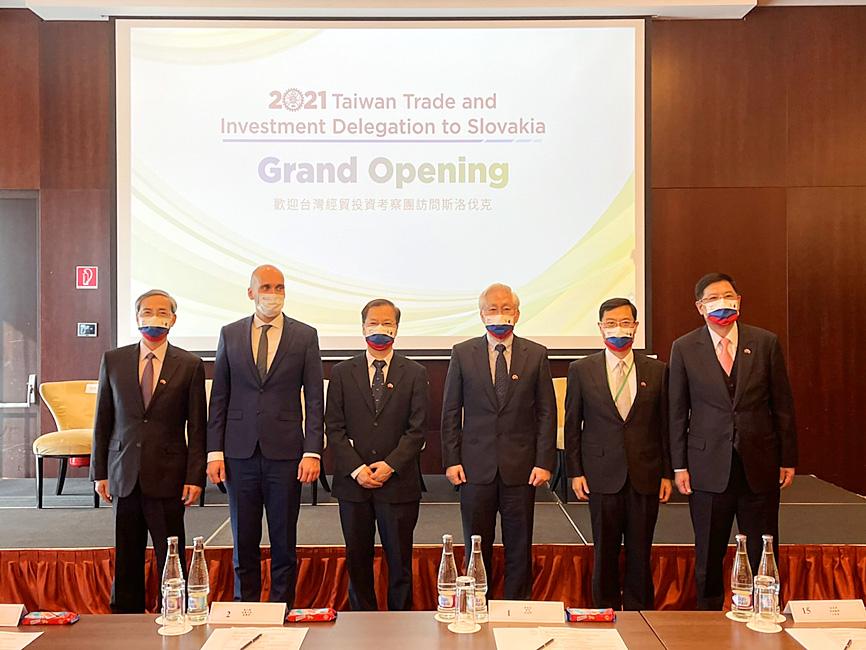A Taiwanese delegation to Slovakia signed seven memorandums of understanding (MOU) with public and private entities, including a space technology pact that would bring to Taiwan a project related to a blockchain application used by the European Space Agency, officials said on Friday.
The 66-person delegation led by National Development Council Minister Kung Ming-hsin (龔明鑫) and Minister of Science and Technology Wu Tsung-tsong (吳政忠) yesterday concluded their three-day visit to Slovakia.
The two sides on Thursday held a bilateral cooperation conference to exchange views on technology, higher education and innovative research, the Ministry of Science and Technology said in a statement yesterday.

Photo: CNA
The Taiwanese delegation was received by Slovak Academy of Sciences vice president for international relations Zuzana Panczova and other representatives from the Slovak Ministry of Education and Slovak Research and Development Agency, it said.
Since the ministry and the academy in 1996 signed a science and technology cooperation agreement, they have funded more than 20 three-year joint research projects, the ministry said.
Wu on Friday witnessed the signing of an MOU by the Taiwan Space Industry Development Association, the Slovak space company 3IPK and its partner company Decent, laying the foundation for a trilateral cooperation framework, it said.
The association was represented by chairman Wu Jong-shinn (吳宗信), who is also the director-general of the National Space Organization, it said.
The two Slovak companies in February had visited the space organization’s headquarters at the Hsinchu Science Park (新竹科學園區) along with Slovak Economic and Cultural Office Taipei Representative Martin Podstavek.
With the office’s support, 3IPK and Decent would provide a proof of concept project in Taiwan based on a blockchain application used by the European Space Agency, the ministry said.
Decent is a start-up supplying blockchain software as a service, while 3IPK is a space blockchain company that became a member of the Slovak Security and Defense Industry Association in 2019, it added.
Hsinchu Science Park Bureau Director-General Wayne Wang (王永壯) on Friday signed an MOU with the Research Center of the University of Zilina, represented by its director Filip Pastorek, it said.
The research center, established in 2013, focuses on monitoring and evaluating transportation infrastructure, advanced materials, smart architecture and renewable energy, the ministry said.
The two sides’ cooperation creates a win-win situation, as the center specializes in technical research, while the science park is strong in technical applications, the ministry said, adding that their initial cooperation would focus on experience sharing and personnel exchanges.
A Slovak delegation planned to visit Taiwan in May, but the trip has been postponed several times.
Following its visit to Slovakia, the Taiwanese delegation yesterday turned to the Czech Republic, where it plans to stay until Tuesday, next visiting Lithuania from Tuesday to Friday, the Ministry of Foreign Affairs said.

DAREDEVIL: Honnold said it had always been a dream of his to climb Taipei 101, while a Netflix producer said the skyscraper was ‘a real icon of this country’ US climber Alex Honnold yesterday took on Taiwan’s tallest building, becoming the first person to scale Taipei 101 without a rope, harness or safety net. Hundreds of spectators gathered at the base of the 101-story skyscraper to watch Honnold, 40, embark on his daredevil feat, which was also broadcast live on Netflix. Dressed in a red T-shirt and yellow custom-made climbing shoes, Honnold swiftly moved up the southeast face of the glass and steel building. At one point, he stepped onto a platform midway up to wave down at fans and onlookers who were taking photos. People watching from inside

MAKING WAVES: China’s maritime militia could become a nontraditional threat in war, clogging up shipping lanes to prevent US or Japanese intervention, a report said About 1,900 Chinese ships flying flags of convenience and fishing vessels that participated in China’s military exercises around Taiwan last month and in January last year have been listed for monitoring, Coast Guard Administration (CGA) Deputy Director-General Hsieh Ching-chin (謝慶欽) said yesterday. Following amendments to the Commercial Port Act (商港法) and the Law of Ships (船舶法) last month, the CGA can designate possible berthing areas or deny ports of call for vessels suspected of loitering around areas where undersea cables can be accessed, Oceans Affairs Council Minister Kuan Bi-ling (管碧玲) said. The list of suspected ships, originally 300, had risen to about

A Vietnamese migrant worker yesterday won NT$12 million (US$379,627) on a Lunar New Year scratch card in Kaohsiung as part of Taiwan Lottery Co’s (台灣彩券) “NT$12 Million Grand Fortune” (1200萬大吉利) game. The man was the first top-prize winner of the new game launched on Jan. 6 to mark the Lunar New Year. Three Vietnamese migrant workers visited a Taiwan Lottery shop on Xinyue Street in Kaohsiung’s Gangshan District (崗山), a store representative said. The player bought multiple tickets and, after winning nothing, held the final lottery ticket in one hand and rubbed the store’s statue of the Maitreya Buddha’s belly with the other,

Japan’s strategic alliance with the US would collapse if Tokyo were to turn away from a conflict in Taiwan, Japanese Prime Minister Sanae Takaichi said yesterday, but distanced herself from previous comments that suggested a possible military response in such an event. Takaichi expressed her latest views on a nationally broadcast TV program late on Monday, where an opposition party leader criticized her for igniting tensions with China with the earlier remarks. Ties between Japan and China have sunk to the worst level in years after Takaichi said in November that a hypothetical Chinese attack on Taiwan could bring about a Japanese